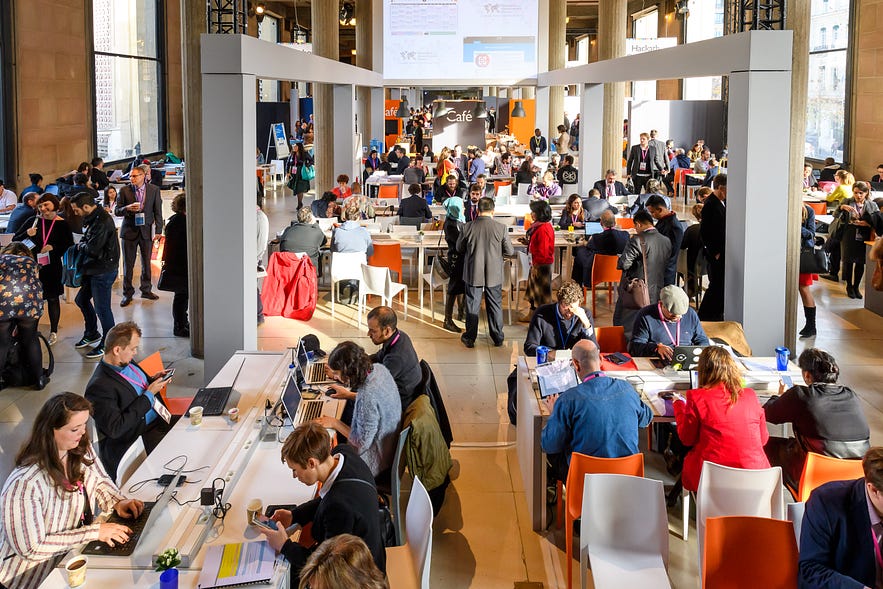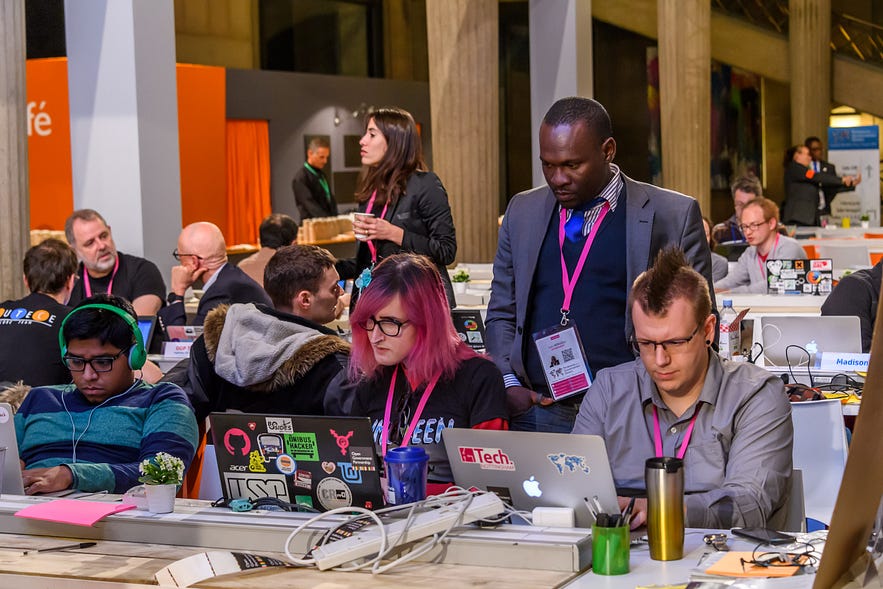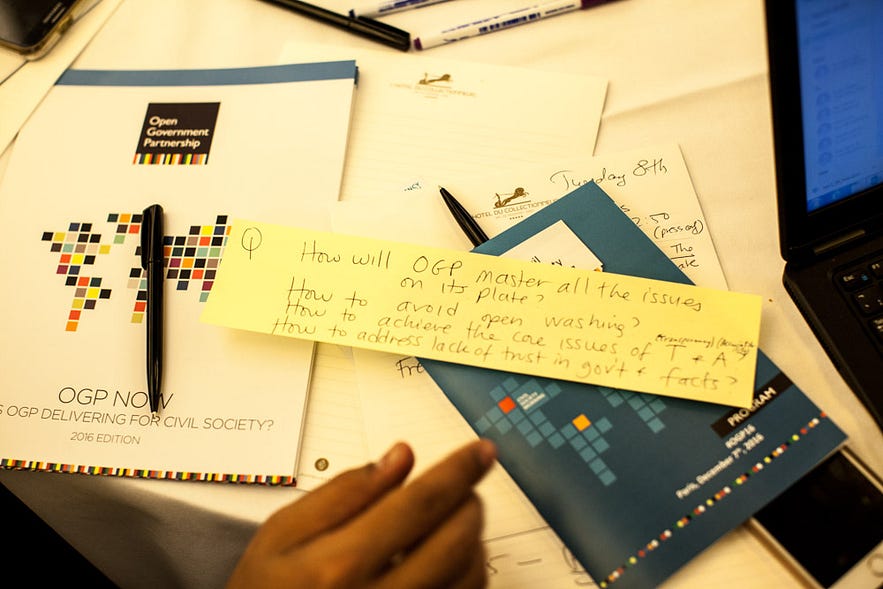Open Government matters more than ever. Here’s 5 reasons why
This post originally appeared on Medium.

The main hall at Palais d’Iena was a hive of activity during OGP16 in Paris.. Credit: Evan Abramson
At the end of a dark year, a remarkable community of people from diverse sectors gathered in Paris earlier this month at the Open Government Partnership Summit. More than 4,000 representatives of government, civil society, technology, civic activism came together around a common cause – the belief that openness and transparencyAccording to OGP’s Articles of Governance, transparency occurs when “government-held information (including on activities and decisions) is open, comprehensive, timely, freely available to the pub... More can lead to better outcomes.
The need for hope has never been greater. I plugged myself into the energyEnsuring universal access to sustainable, dependable, and affordable energy is critical to every aspect of prosperity. Increasing public oversight and transparency in the energy sector can help to ens... More and can-do spirit of the summit for two days and came out a bit transformed. I was reminded that politics and government are not the same. While political elites have wept in 2016, public servants the world over have continued to work hard on improving the basic functions of government, relying on digital tools to enable greater openness, to shine a light on corruption and poor accountability, and empower citizens to have a voice in decision making.
At many sessions at OGP16 I heard the same mantra over and over again: it doesn’t take many to make a difference. A few determined people can have a big impact. Here are some tools. Don’t give up.
Why aren’t more people talking about the Open Government Partnership? Despite being dubbed the COP21 of digital democracy by some, the summit went almost unnoticed in the press. Launched in 2011 by the Obama administration, it was intended to create a new way for government actors and civil society to collaborate on the biggest challenges facing public policy: human rightsAn essential part of open government includes protecting the sacred freedoms and rights of all citizens, including the most vulnerable groups, and holding those who violate human rights accountable. T..., global environmental change, fighting corruption, universal access to knowledge. In essence, the open government movement is about empowering citizens in the distribution and allocation of public resources.
From an initial eight member countries, the partnership has grown to 74.
Perhaps the low level of attention comes down to the media’s inability to handle issues which are complex, cross-cutting and more to do with processes than outcomes. This is a problem. OGP is clearly important, yet the media isn’t able to take this on board, and convey it to the public.
4th Open Government Partnership Global Summit… by SGMAP
I stumbled into OGP16 almost by accident. A friend mentioned it to me, and I registered without knowing anything about it, or even why I might want to participate. It sounded like it was about government, and yet OGP is a partnership between government and civil society. This makes it feel like a movement. What brings people together is not where they work, or what issues they work on, but rather a commonly held belief in the value of openness and transparency, and a passion to share what they have learned. The “together we are stronger” ethos was palpable and genuinely felt in all the sessions I attended.
Too often the intention of including civil society ends up being talking at power in a broadcasting mode. I’ve seen this at the United Nations in the so-called “Major Groups” system. Science, women, trade unions, children and youthRecognizing that investing in youth means investing in a better future, OGP participating governments are creating meaningful opportunities for youth to participate in government processes. Technical ... More and so on are allocated a few minutes in plenary to deliver a statement to member states.
OGP is different. Each country is required to co-create and implement a “National Action PlanAction plans are at the core of a government’s participation in OGP. They are the product of a co-creation process in which government and civil society jointly develop commitments to open governmen...” together with civil society. Indeed, “action oriented” is a core principle. “We are not just about statements at conferences,” I heard at a packed-out “OGP Basics” session.
More than 4,000 people from 141 countries participated. It was a heady mix of content and styles: government ministers alongside civic activists, technologists, civil society folks.

Government, civil society & technologists worked side by side at OGP16. Photo: Evan Abramson

Diverse communities coming together around transparency, openness, accountability. Photo: Evan Abramson
Unlike at UN summits, where hierarchy is expressed via a complex registration system and colour-coding scheme for conference badges that define your status and which parts of the event you have access to, OGP was open to all.
Here are 5 reasons why the open government movement matters:
1. The dominant political divide in the 21st century isn’t about left versus right, but about open versus closed. As Alex Howard of the Sunlight Foundation wrote recently on the eve of OGP16,
“the value of open government forms and freedom of information laws may never be more clear to the public than in the years ahead, where the antagonism towards a free press and scientific data displayed this year may be amplified in the next White House.”
2. Rich and poor nations struggle equally in the fight for greater openness and transparency. Whether you are a civil servant from Sri Lanka, Nigeria or Australia, barriers and disincentives are everywhere. For example, one participant from Canberra told how his country’s national action plan hit a snag when it became apparent there weren’t enough civil society organizations available to meet the criteria.
3. Progress on National Action Plans has been slow. More than half have failed to meet their objectives. The people in charge of monitoring the plans know why: many plans were drafted by a small handful of people in one agency or ministry. Not all the right people were around the table.
4. Open-washing is a thing. This is a brilliant term which I discovered at the summit. In government, it is happening when information released about contracts is not detailed enough for the public to have a full picture of what that contract means: questions like, who were the bidders? How and to whom was the contract awarded? And how was the money spent? cannot be answered. I was told “Often the smartest politicians jump on the bandwagon of open first, they get it that they have something to gain.”
5. If you control the digital tools, you have the power. This was the take home message from a great workshop faciliated by Justin Hermann and Seamus Kraft on “How to build participatory communities that deliver”. I sat alongside people from non-democratic countries who feared for their personal safety on trying to provide independent analyses of government data to citizens via social media. It was humbling and inspiring to witness their courage, the fact that they were there, telling their stories, looking for help, sharing their lessons learned.
